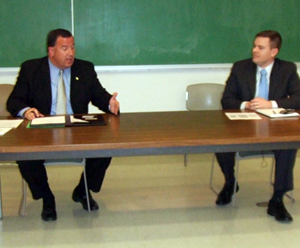 |
From left, David Kramer, Nebraskans United campaign manager, outlines his opposition to Initiative 424, while Doug Tietz, executive director of the Nebraska Civil Rights Initiative, looks on. |
If passed, Initiative 424 would change Nebraska’s constitution to prohibit the consideration of gender, race, ethnicity or national origin in public contracting, public employment and public education.
Fifty UNMC faculty, staff and students had the opportunity to hear from a proponent and opponent of the measure and ask questions about the potential impact of the initiative on our campus.
Faculty Senate president and moderator of the event, Jim Turpen, Ph.D., said the forum was designed to be educational in nature.
“UNMC cannot take a formal position on this issue,” Dr. Turpen said. “Since this initiative is of interest to members on our campus, the faculty senate supports dialogue and debate on its merits.”
David Kramer, spokesperson and campaign manager for Nebraskans United, the group dedicated to preserving equal opportunity, told the audience the initiative’s greatest impact will be in public education.
If passed, UNMC would be prohibited from administering private scholarships from donors who specify their gift based on gender, race, ethnicity or national origin, he said.
|
Doug Tietz, executive director for the Nebraska Civil Rights Initiative, which petitioned for the measure to be placed on the ballot, said his group’s effort centers on removing discrimination in government institutions.
“Why can’t you just consider 39 criteria instead of 40?” he asked. “I believe our government should look beyond gender and race and bring people in not based on what they look like but their qualifications.”
Kramer argued that happens now. Quotas and set asides are illegal, he said. Kramer also pointed out the difference in California’s minority enrollment after a similar initiative became law.
“Approximately 30 percent of high school graduates in California were African American or Hispanic in 1996. Today, that percentage is nearly 50 percent,” Kramer said. “Despite that growth, African American and Hispanic enrollment in the UC system is still lower today than it was 12 years ago.”
Both men agreed Nebraska does not have state statutes that grant preferential treatment.
Questions from audience members reflected similar themes from the impact on recruiting faculty to the fate of outreach programs for underrepresented groups.
Tietz was quick to point out the university can still have those programs.
“In California, (the first state to pass a similar ballot initiative) recruitment programs such as women in engineering still exist but are just open to anyone,” Tietz said. “So, you could still have a Latino outreach day, but anyone can attend.”
“But, it’s not a Latino outreach day, is it?” Kramer asked. “Simply put, I’m against this initiative because what the words say and what the words do are two very different things. There are significant, unintended consequences to changing our constitution.”
Something, both men, will just have to disagree on.